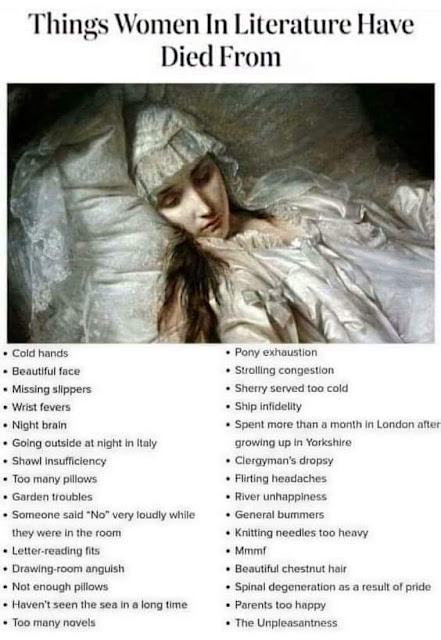You may have seen this around on the Internet:
I've been searching to find where these are from. I have found the following based on what I have read and what I have found other people's attempts to answer it:
cold hands - La Boheme
beautiful face - I saw some say "The Lady of Shallot", but I think "The Birth-Mark" might be more accurate
missing slippers - ???
wrist fevers - Beth from Little Women tends to be the go to for several of these. I have not read it, so I am not sure.
night brain - Anna Karenina
going outside at night in Italy - Daisy Miller
shawl insufficiency - Beth from Little Women again
too many pillows - Desdemona from Othello??
garden troubles - "Rapaccini's Daughter"
someone said "No" very loudly while they were in the room - ???
letter reading fits - ???
drawing room anguish - ???
not enough pillows - Wuthering Heights??
haven't seen the sea in a long time - Lord of the Rings (Boromir's mother) and "The Awakening"
too many novels - Madam Bovery
pony exhaustion - Gone with the Wind
strolling congestion - ???
sherry served too cold - ???
ship infidelity - Far Side of the World
spent more than a month in London after growing up in Yorkshire - ???
clergyman's dropsy - ???
flirting headaches - ???
river unhappiness - Hamlet
general bummers - Tess of the Dubervilles ???
knitting needles too heavy - Beth from Little Women again
mmmf - didn't know what this meant until I started looking for answers to this
beautiful chestnut hair - "The Adventures of the Crooked Man" (Sherlock Holmes story)
spinal degeneration as a result of pride - ???
parents too happy - ???
the unpleasantness - ???
So now, I need your help - what are the rest of them? Any thoughts? I am also trying to track down the origin of the image. If I can, I may be able to get the originator's thoughts on it.










